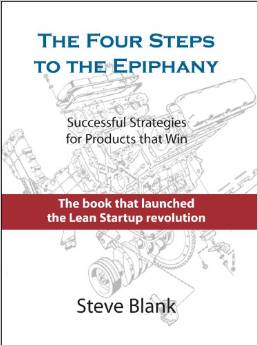On a recent long drive to Upstate New York, my wife asked me for the books that impacted my life. I found it surprising how easily I could name each book, and was even able to recall the look and feel of my personal copy (some of which sadly did not survive my wife's many Stalinistic book purges). Here is my list:
Four Steps to the Epiphany
I’d spent years thinking great products came from great ideas. Steven Blank’s class notes turned book introduced me to the concept of customer-driven development as a means of discovering the great product. Years later Eric Ries would make this concept popular with the catchy name “Lean Startup” - but for me the Four Steps will always be the authoritative source.
The Innovator’s Dilemma
The argument for why big companies fail to respond to disruptive innovations is simple and powerful. This book helped me look for the macro changes occurring within technical movements, and put them in their proper historical context as a means to better predict their future. If you were building a top 20 business books of all time, I’d be surprised if Clayton Christensen seminal work didn’t make everyone’s list.
Data Access In An Object-Oriented Environment
You won’t find this book anywhere but my personal bookshelf. It is an IBM Redbook I special ordered while working at my first job after school. At the time I received the book, I had been struggling in writing an object to relational framework for a Smalltalk environment. This book both validated many of my early concepts and was like a lifeline to let me know I was not alone.
Soul of a New Machine

I lived dual lives in college. On one hand I was a computer science major who spent late nights at the labs, and on the other I was a writing minor who was writing (or attempting to write) short stories and plays. My writing professor, Leigh Wilson, asked me one day if I had read Tracy Kidder’s book on Data General. She had a slight look of horror when I said no, and lent me her copy. Over the years I have read hundreds of books on tech history, but this has the distinction of being the first.
The Things They Carried
I’m not a big reader of war memoirs / novels, but this book is a reminder of the power of great writing. The book is part fiction, part memoir, and is packed full of hauntingly raw narrative that leaves you as a writer thinking: I’m not worthy. I still pick this up from time to time to see if it has lost any of its impact over the years (it has not).
Power C

I think it was late high school or freshman year college I found the full page ad for a $19 C compiler in the back of the Computer Shopper magazine. At the time, owning a C compiler was out of reach for most students. The compiler and its accompanying book set me on a path to not only become a strong C programmer, but also gain a much deeper appreciation for the hardware on which I developed. I still consider this today to be the best $19 I have ever spent.
The Snows of Kilimanjaro and Other Stories
I know Ernest was a misogynist with some serious unresolved sexual identity issues, but reading these short stories in high school was the first time I honestly wanted to write. Until then I’d been bored to tears with learning grammar, sentence structure, vocabulary, and all the other things that can leave a student thinking writing is a mechanical and soulless pursuit. It’s a shame Ernest was such a flawed and tortured soul, because even years after his suicide he is still creating writers.
Keep on the Borderlands

What proper geek from my generation would not reference a Gary Gygax Dungeons & Dragons module as a book that impacted his life? ;) As much as I enjoyed the Tolkien books, I read them for entertainment. Reading The Keep in middle school set me off writing my own modules, in hope I could be paid $3K by TSR if mine was ever published. I will forever claim the modules I wrote and never published inspired by The Keep to be my first technical writing.
What Do People Do All Day
My list just wouldn't be complete without this one: this Richard Scarry book was read to me countless times as a young child, and can still see the pictures of pigs building a chimney and cats working in a dentist office. Like any great children’s book, it made me want to read, and showed me the world that books could open for me.
